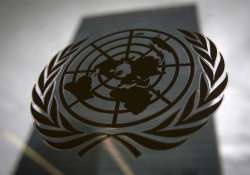'Global framework needed for total elimination of n-weapons'
United Nations: Voicing its commitment to unilateral moratorium on nuclear explosive testing, India has said the goal of complete elimination of nuclear weapons can be achieved by a "global and non-discriminatory" multilateral framework.India's Permanent Representative

United Nations: Voicing its commitment to unilateral moratorium on nuclear explosive testing, India has said the goal of complete elimination of nuclear weapons can be achieved by a "global and non-discriminatory" multilateral framework.
India's Permanent Representative to the Conference on Disarmament Venkatesh Varma also told a First Committee meeting in the UN General Assembly yesterday that India has vital developmental and security interests in space as a major space faring nation and backs strengthening the international legal regime to protect and preserve access to space.
Varma said all states possessing nuclear weapons can make a contribution by engaging in a meaningful dialogue to build trust and confidence by reducing the salience of nuclear weapons in international affairs and security doctrines.
"The goal of the complete elimination of nuclear weapons can be achieved by a step by step process underwritten by a universal commitment and an agreed multilateral framework that is global and non-discriminatory," he said at a First Committee meeting in the UN General Assembly here yesterday.
He said India believes that increasing the restraints on the use of nuclear weapons is not only an essential first step but it is also necessary in the current complex international environment in enhancing strategic trust globally.
Varma pointed out that India continues to keep under review the Arms Trade Treaty (ATT) from the perspective of its defence, security and foreign policy interests.
"We would be watching how the treaty is implemented especially in view of some of the gaps in the Treaty that India had pointed out during its negotiation and which have become only more pronounced since then," he said.
Read Also: 'Enormous progress in India-US ties under PM Modi'
As a major space faring nation, India has vital developmental and security interests in space, Varma told the UN body.
"India supports strengthening the international legal regime to protect and preserve access to space for all and to prevent without exceptions, the weaponisation of Outer Space," he said.
Varma added that discussions on a draft International Code of Conduct for Outer Space Activities should be inclusive, covering all space faring nations to ensure a product of universal acceptance adopted by consensus and through a process anchored in the UN.
India considers the Conference on Disarmament (CD) as the appropriate forum for the commencement of negotiations on nuclear disarmament and believes that there are inherent dangers in some recent proposals to fragment the disarmament agenda or splinter the established disarmament machinery.
Without prejudice to the priority attached to nuclear disarmament, India supports the commencement of negotiations on FMCT (Fissile Material Cutoff Treaty) in the CD on the basis of the mandate in CD/1299, and shares the widely felt disappointment that such negotiations continue to be blocked.
He reiterated that India's nuclear doctrine continues to stress a policy of credible minimum deterrence with a posture of no-first use and non-use against non-nuclear weapon states.
"We remain committed to maintaining a unilateral and voluntary moratorium on nuclear explosive testing," he said.
He also called for the international community to continue to exercise utmost vigilance against terrorist groups gaining access to Weapons of Mass Destruction and related materials and technologies.
India has completed its obligations on stockpile destruction under the Chemical Weapons Convention, he said, adding that timely destruction by other state parties of the remaining stockpiles is critical for upholding the credibility and integrity of the Convention.